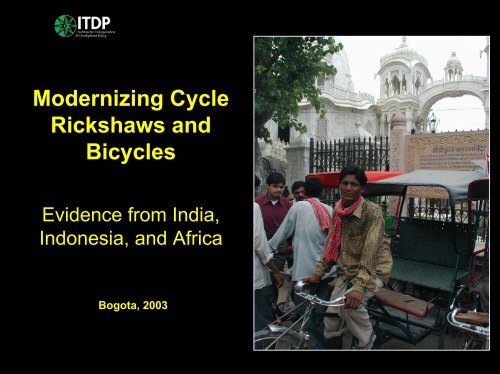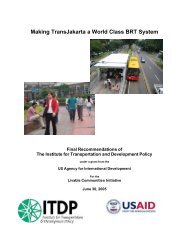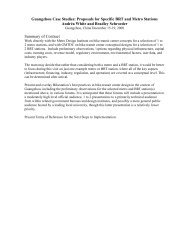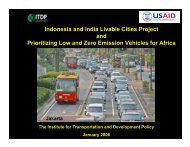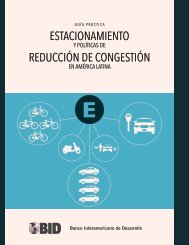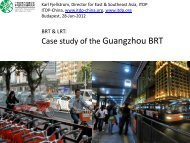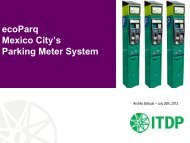Modernizing Cycle Rickshaws and Bicycles
Modernizing Cycle Rickshaws and Bicycles
Modernizing Cycle Rickshaws and Bicycles
Create successful ePaper yourself
Turn your PDF publications into a flip-book with our unique Google optimized e-Paper software.
<strong>Modernizing</strong> <strong>Cycle</strong><br />
<strong>Rickshaws</strong> <strong>and</strong><br />
<strong>Bicycles</strong><br />
Evidence from India,<br />
Indonesia, <strong>and</strong> Africa<br />
Bogota, 2003
Traditional <strong>Rickshaws</strong> are Losing<br />
Passengers in India Because…<br />
• Not very comfortable with no sun protection<br />
• Very heavy, <strong>and</strong> the passenger feels guilty<br />
• Associated with backwardness<br />
• Dangerous roads<br />
• Hostile traffic police
Why Should We Care?<br />
• Reduces traffic congestion<br />
<strong>and</strong> air pollution<br />
• Increases the incomes of the<br />
poor<br />
• Improves basic mobility <strong>and</strong><br />
safety for women <strong>and</strong> children<br />
• Improves the health <strong>and</strong><br />
reduce the drudgery of cycle<br />
rickshaw operators.
Why Government Authorities Are<br />
Sometimes Hostile to <strong>Cycle</strong> <strong>Rickshaws</strong><br />
• Control rural-urban<br />
migration<br />
• Image of Backwardness<br />
• Motorists complain<br />
they block the road<br />
• Taxis <strong>and</strong> motorcycle<br />
rickshaws are more<br />
powerful politically.<br />
• Associated with crime,<br />
riots, or social<br />
movements.<br />
<strong>Rickshaws</strong> Being Confiscated in Delhi
Why Governments Support <strong>Modernizing</strong><br />
Human Powered Vehicles<br />
• To help the poor people<br />
• To impose new regulations in certain areas<br />
• To improve the image of cycle rickshaws<br />
• To quiet, pollution-free<br />
travel in tourist areas
Why Even Environmentalists <strong>and</strong> NGOs<br />
Support Some Regulation of these Vehicles<br />
• Increases wages<br />
• Reduces the threat of crime<br />
• Reduces the danger of accidents at night<br />
<strong>Cycle</strong> Rickshaw unions<br />
should be encouraged<br />
<strong>and</strong> supported in order to<br />
protect the drivers <strong>and</strong><br />
create self-regulation<br />
Becak Union
Why the private sector doesn’t innovate on<br />
their own<br />
• Profit margin is too low<br />
• Producers are risk-averse small businesses<br />
• Consumers are risk-averse low income people<br />
Underwriting the risks of new<br />
product development,<br />
marketing, <strong>and</strong> dissemination<br />
can overcome these barriers<br />
to modernization.
US <strong>and</strong> Indian Engineers Worked Together
10 Prototypes were developed<br />
20 of each were sold or<br />
leased to <strong>Cycle</strong><br />
Rickshaw Wallahs
The largest manufacturer<br />
<strong>and</strong> a new competitor were<br />
involved in the design <strong>and</strong><br />
marketing from the<br />
beginning<br />
Sunil Kumar, Hari Om<br />
G. Shyam, Designer, (left) w/<br />
Mr. Gupta <strong>and</strong> Gupta of Shiv<br />
Shakti Udyog Ltd.
The Final Design (more or less)<br />
Production Cost:<br />
Same as<br />
traditional<br />
rickshaw<br />
•30 kilograms lighter weight<br />
•Wide, comfortable woven nylon seat<br />
•Permanent canopy for sun <strong>and</strong> rain protection<br />
•Integral (one-piece) frame two speed gear system
The First Trial Fleet<br />
Was Sold to the<br />
Wallahs at the<br />
Sheraton near the<br />
Taj Mahal.<br />
A marketing firm was<br />
hired to sell the vehicles.<br />
There were bonuses for<br />
each sale.
The Wallahs at the East <strong>and</strong> West Gates of<br />
the Taj Mahal were the second sale
Press Conferences <strong>and</strong> Events with Mayors<br />
<strong>and</strong> Other Government Leaders Boosted<br />
Sales <strong>and</strong> Investor Confidence
Selling the traditional financiers <strong>and</strong><br />
fleet owners in the city of Vrindavan<br />
led to the rapid replacement of the<br />
entire fleet (1000 vehicles).
With big orders, the<br />
new market entrant,<br />
Shiv Shatki Udyog<br />
invested in ‘mass<br />
production.’ The<br />
project team built<br />
the necessary jigs.<br />
This forced Hari Om, the traditional manufacturer,<br />
to switch as well.
Why Did the Financiers (Maleks) Switch?<br />
• The operators got more<br />
passengers because the<br />
vehicles were more<br />
comfortable.<br />
• The maleks were able to<br />
charge higher rent.<br />
• The vehicles cost only<br />
marginally more.<br />
• Hence, the new vehicles<br />
were more profitable.<br />
NOBODY (EXCEPT THE PRESS) CARED ABOUT THE HUMANITARIAN REASONS!
By the end of the project,<br />
there were three<br />
fully commercial<br />
assemblers<br />
<strong>and</strong> 2 frame<br />
manufacturers.<br />
Two were the traditional<br />
manufacturers.
The Agra Frame manufacturer<br />
opened in Delhi, <strong>and</strong> began selling<br />
400 modern vehicles a month.<br />
This forced the<br />
Maleks in Delhi<br />
to switch.
Today…<br />
• Over 18,000 modern cycle rickshaws are<br />
operating on Indian Streets<br />
• They operate in 9 Indian cities<br />
• There are over 20 maleks in Delhi <strong>and</strong><br />
another 10 assemblers <strong>and</strong> manufacturers of<br />
the modern rickshaws around India.<br />
•None of the gear systems were commercially<br />
accepted.<br />
•Certain elements of the traditional vehicle were<br />
reintroduced, increasing the weight, so total<br />
weight reduction was only about 10kg-15kg.
Impact of the Project on the Poor<br />
• The operators (most of them are poor) earn on average<br />
50% more income<br />
• They pay 5% - 10% of this to the owner in higher rental<br />
fees<br />
• They make more per ride<br />
• They carry more passengers per ride<br />
• They get more rides<br />
• They operate in areas where no cycle rickshaws<br />
previously operated<br />
• The 10% - 25% weight reduction reduces the<br />
calories the operator burns per day <strong>and</strong> hence<br />
the food they need to survive.<br />
• They are much more comfortable for sleeping!
How Modern <strong>Cycle</strong> Rickshaw Passengers<br />
Would Otherwise Have Made their Trip<br />
TRAD. RICKSHAW<br />
WALK/BICY<br />
CLE<br />
19%<br />
PRIVATE<br />
SCOOTER<br />
2%<br />
TANGA<br />
15%<br />
VIKRAM<br />
19%<br />
TRAD.<br />
RICKSHAW<br />
28%<br />
BUS<br />
11%<br />
AUTO<br />
RICKSHAW<br />
6%<br />
BUS<br />
AUTO RICKSHAW<br />
VIKRAM<br />
PRIVATE<br />
SCOOTER<br />
WALK/BICYCLE<br />
TANGA
Project Replication in<br />
Indonesia:<br />
Gadjah Mada University,<br />
Yogyakarta
Trial Fleet of 20 Vehicles Went Into<br />
Operation December 2002<br />
One Development Bank has<br />
ordered 400 to sell on credit
• Final Prototype is half the weight (50kg) of the traditional becak (100kg)<br />
• All have Shimano 7 speed rear derailleur.<br />
• The production cost is 20% higher but will be brought to parity.<br />
• The h<strong>and</strong>ling is much better.<br />
• It has much better visibility at night.<br />
• The vehicle is somewhat more comfortable.
<strong>Modernizing</strong> the Normal Bicycle in Africa<br />
Trek’s California Bike is the first effort by a Global<br />
bicycle industry leader to find a market in Africa.
Obstacles to Better Bikes in Africa<br />
• Most bike dealers are too<br />
small to import full<br />
container loads direct from<br />
China or India.<br />
• Profit margins are too low<br />
to invest in marketing.<br />
• <strong>Bicycles</strong> are not designed<br />
for African utilitarian use.<br />
• Some countries have<br />
higher tariff barriers than<br />
on cars.<br />
• All bikes <strong>and</strong> parts are<br />
imported<br />
Accra <strong>Cycle</strong> Market
ITDP Solutions:<br />
The Global Bicycle Fund<br />
• Forging buyers collectives to reach<br />
returns to scale<br />
• Working directly with international bike<br />
companies<br />
• Providing credit <strong>and</strong><br />
technical assistance to the<br />
African Bicycle Industry
Bicycle Caravan, Accra, Ghana,<br />
January 2003<br />
ITDP Solutions:<br />
Working with<br />
Local Government<br />
<strong>and</strong><br />
the Bicycle Industry<br />
to Promote<br />
Utilitarian Cycling


